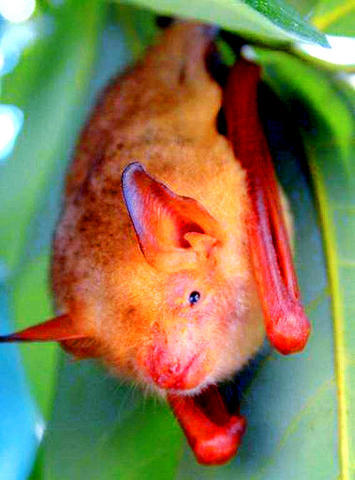Local biologists have successfully sampled the ultrasonic frequencies of several bat species endemic to Taiwan, providing a substantial basis for future research and distribution surveys, sources at the Endemic Species Research Institute (ESRI) under the Council of Agriculture said yesterday.
ESRI associate research fellow Cheng Hsi-chi (鄭錫奇) said that bats depend on ultrasonic ranging abilities, or echolocation, to navigate their way around the environment and detect their prey, and that based on the fact that different species emit ultrasonic waves at specific audio frequencies, these frequencies can thus be used as a "voice fingerprint" in bat identification.
In a project that began last year, the researchers first captured bats and identified their classification, then recorded their voice after releasing them, Cheng said, adding that ESRI researchers acquire three stable audio samples from five different adult bats of the same species to ensure the accuracy of the database.

PHOTO COURTESY OF THE ENDEMIC SPECIES RESEARCH INSTITUTE
"The database now contains the voice fingerprints of 11 local bat species," Cheng noted. "From now on, we will be able to identify an unknown bat by its voice."
The surveys also yielded some very interesting results, Cheng said.
For example, members of the same species living in different regions have minor variations in frequency, an evolution similar to dialects in human languages.
Cheng said that when multiple bats of the same species hunt in the same area, they also voluntarily add minor variations to their frequency, thereby avoiding interference with each other.
Cheng said the database, the first in Taiwan, will help researchers understand bat distribution.

‘DENIAL DEFENSE’: The US would increase its military presence with uncrewed ships, and submarines, while boosting defense in the Indo-Pacific, a Pete Hegseth memo said The US is reorienting its military strategy to focus primarily on deterring a potential Chinese invasion of Taiwan, a memo signed by US Secretary of Defense Pete Hegseth showed. The memo also called on Taiwan to increase its defense spending. The document, known as the “Interim National Defense Strategic Guidance,” was distributed this month and detailed the national defense plans of US President Donald Trump’s administration, an article in the Washington Post said on Saturday. It outlines how the US can prepare for a potential war with China and defend itself from threats in the “near abroad,” including Greenland and the Panama

A wild live dugong was found in Taiwan for the first time in 88 years, after it was accidentally caught by a fisher’s net on Tuesday in Yilan County’s Fenniaolin (粉鳥林). This is the first sighting of the species in Taiwan since 1937, having already been considered “extinct” in the country and considered as “vulnerable” by the International Union for Conservation of Nature. A fisher surnamed Chen (陳) went to Fenniaolin to collect the fish in his netting, but instead caught a 3m long, 500kg dugong. The fisher released the animal back into the wild, not realizing it was an endangered species at

The High Prosecutors’ Office yesterday withdrew an appeal against the acquittal of a former bank manager 22 years after his death, marking Taiwan’s first instance of prosecutors rendering posthumous justice to a wrongfully convicted defendant. Chu Ching-en (諸慶恩) — formerly a manager at the Taipei branch of BNP Paribas — was in 1999 accused by Weng Mao-chung (翁茂鍾), then-president of Chia Her Industrial Co, of forging a request for a fixed deposit of US$10 million by I-Hwa Industrial Co, a subsidiary of Chia Her, which was used as collateral. Chu was ruled not guilty in the first trial, but was found guilty

DEADLOCK: As the commission is unable to forum a quorum to review license renewal applications, the channel operators are not at fault and can air past their license date The National Communications Commission (NCC) yesterday said that the Public Television Service (PTS) and 36 other television and radio broadcasters could continue airing, despite the commission’s inability to meet a quorum to review their license renewal applications. The licenses of PTS and the other channels are set to expire between this month and June. The National Communications Commission Organization Act (國家通訊傳播委員會組織法) stipulates that the commission must meet the mandated quorum of four to hold a valid meeting. The seven-member commission currently has only three commissioners. “We have informed the channel operators of the progress we have made in reviewing their license renewal applications, and